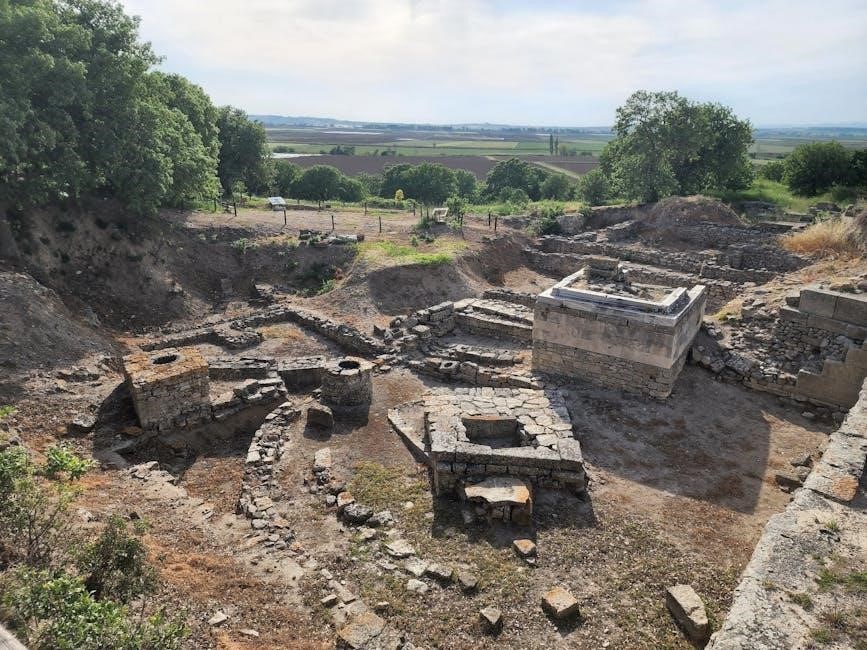iliad lattimore pdf

Richmond Lattimore‚ an esteemed American poet and classicist‚ was born on May 6‚ 1906‚ in Paotingfu‚ China. His profound impact on classical literature stems from his translations‚ most notably his rendition of Homer’s Iliad which became a standard.
Richmond Lattimore‚ born in Paotingfu‚ China‚ on May 6‚ 1906‚ demonstrated an early aptitude for languages and literature. His upbringing instilled in him a deep appreciation for diverse cultures‚ which later influenced his approach to translating classical texts. He eventually returned to the United States for his education‚ attending Dartmouth College‚ where he began his formal study of the classics.
Lattimore’s early exposure to different linguistic traditions shaped his ability to capture the nuances of ancient Greek; This would become a hallmark of his translations. His academic journey led him to further studies at Oxford‚ solidifying his foundation in classical literature and languages. These formative years were essential in developing the skills and sensibilities that would later define his career as a translator and poet.
Lattimore’s unique background‚ combining Eastern origins with Western education‚ provided him with a distinctive perspective that set him apart from other classicists of his time.
Lattimore’s academic journey led him to a distinguished career in classical studies. After completing his education at Dartmouth and Oxford‚ he became a professor‚ notably at Bryn Mawr College‚ where he held the Paul Shorey Professorship of Greek. His teaching profoundly influenced generations of students‚ fostering a love for classical literature and languages. Lattimore’s approach to teaching emphasized close reading and an appreciation for the historical context of ancient texts.
Beyond his teaching role‚ Lattimore contributed significantly to scholarship through his publications and translations. His academic work was characterized by meticulous attention to detail and a commitment to making classical works accessible to a wider audience. He was known for his ability to convey the poetic and dramatic qualities of ancient Greek literature in English. This made his work invaluable to both scholars and general readers.
Lattimore’s dedication to his field and his ability to inspire others solidified his legacy as a leading figure in classical studies.

Richmond Lattimore: Life and Works
Biography and Early Life
Lattimore’s Academic Career
Awards and Recognition
Richmond Lattimore’s contributions to literature and classical studies were widely recognized through numerous awards and honors. His translation of Aristophanes’ “The Frogs” earned him the prestigious Bollingen Poetry Translation Prize in 1962‚ a testament to his skill in rendering ancient Greek verse into compelling English. This award highlighted his ability to capture the humor and wit of Aristophanes while maintaining fidelity to the original text.
Lattimore was also a Fellow of the Academy‚ Oxford‚ an honor that acknowledged his significant contributions to the field of classical studies. This recognition from a leading academic institution underscored the respect and admiration he garnered from his peers. His work on Homer’s Iliad‚ in particular‚ brought him widespread acclaim and solidified his reputation as a master translator.
These accolades reflect the lasting impact of Lattimore’s work and his dedication to making classical literature accessible and engaging for modern readers.
Richmond Lattimore’s 1951 translation of Homer’s Iliad emerged during a period of renewed interest in classical literature‚ aiming for accuracy and poetic grace in bringing the ancient epic to a modern audience.
Historical Context of the Translation
Richmond Lattimore’s translation of the Iliad‚ published in 1951‚ arrived at a time when post-war academia sought renewed engagement with classical texts. Previous translations often leaned towards either overly poetic or rigidly literal interpretations. Lattimore aimed for a balance‚ seeking to capture the epic’s original spirit while remaining accessible to contemporary readers.
This period also saw a growing emphasis on archaeological and historical accuracy in understanding ancient Greece. Lattimore’s work benefited from and contributed to this scholarly trend‚ influencing subsequent translations and interpretations of Homer. His translation sought to present the Iliad not just as a literary masterpiece‚ but as a window into the values and beliefs of ancient Greek society.
Furthermore‚ the mid-20th century witnessed a desire to make classical works more widely available in education. Lattimore’s translation‚ with its accessible language and scholarly rigor‚ became a staple in university classrooms‚ shaping the understanding of the Iliad for generations of students.
Lattimore’s Translation Style and Accuracy
Lattimore’s translation of the Iliad is distinguished by its commitment to both accuracy and poetic form. He opted for a verse translation‚ aiming to replicate the rhythm and flow of Homer’s original Greek. His style is characterized by a formal tone‚ reflecting the epic nature of the poem‚ and a consistent use of dactylic hexameter‚ the meter of the original.
Accuracy was paramount for Lattimore; he strived to remain faithful to the literal meaning of the Greek text. However‚ he also recognized the need to create a readable and engaging English version; He achieved this by employing a vocabulary that is both precise and evocative‚ and by carefully crafting his sentences to capture the nuances of Homer’s language.
While some critics have noted that Lattimore’s fidelity to the original can occasionally result in a somewhat restrained or detached tone‚ his translation is widely praised for its scholarly integrity and its ability to convey the grandeur and emotional power of the Iliad.

Lattimore’s Translation of the Iliad
Reception and Critical Acclaim
Richmond Lattimore’s translation of the Iliad‚ published in 1951‚ was met with widespread praise and quickly established itself as a definitive version for English-speaking readers. Critics lauded Lattimore’s commitment to accuracy‚ his ability to capture the epic scope of the poem‚ and his success in rendering Homer’s verse into a readable and engaging form.
The translation was particularly praised for its faithfulness to the original Greek‚ with many scholars considering it the gold standard for those seeking a close and reliable rendering of the Iliad. Its formal tone and consistent use of dactylic hexameter were seen as strengths‚ preserving the dignity and grandeur of Homer’s epic.
While some critics noted that Lattimore’s focus on accuracy occasionally led to a less emotionally charged or dynamic reading experience compared to other translations‚ the overall reception was overwhelmingly positive. The translation has remained popular for decades and is still considered a valuable resource for students and general readers alike‚ solidifying its place in the history of English translations of the Iliad.
The Iliad centers on the wrath of Achilles and its devastating consequences for the Achaean army during the Trojan War. His rage drives much of the plot and explores themes of honor‚ mortality‚ and fate.
Achilles’ Anger and its Consequences
The epic poem‚ The Iliad‚ fundamentally revolves around the consuming rage of Achilles‚ the son of Peleus‚ and its far-reaching consequences. This anger‚ sparked by Agamemnon’s disrespect and the theft of his war prize‚ Briseis‚ sets in motion a chain of events that profoundly impacts the Achaean war effort against Troy. Achilles’ withdrawal from battle leads to significant losses for the Achaeans‚ highlighting the crucial role of individual actions in shaping collective destinies.
His refusal to fight allows the Trojans‚ led by Hector‚ to gain considerable ground‚ pushing the Achaeans to the brink of defeat. The consequences of Achilles’ anger extend beyond the battlefield‚ affecting the morale and unity of the Achaean army. Ultimately‚ it is the death of his close companion‚ Patroclus‚ that reignites Achilles’ fury‚ compelling him to return to battle and seek vengeance‚ thus altering the course of the war once more and underscoring the destructive power of unchecked emotion.
The Role of Gods in the Iliad
The Olympian gods play a significant and active role in the events of The Iliad‚ directly influencing the course of the Trojan War and the fates of both mortals and heroes. These deities are not mere observers; they are deeply invested in the conflict‚ often taking sides and intervening in battles to aid their favored warriors. Their interventions range from providing divine assistance to manipulating events to achieve their own agendas.
Zeus‚ the king of the gods‚ attempts to maintain a neutral stance but is often swayed by the pleas of other deities. Hera‚ fiercely protective of the Achaeans‚ actively works against the Trojans‚ while Apollo champions the Trojan cause. Athena‚ a staunch supporter of the Achaeans‚ frequently guides and protects their heroes. The gods’ involvement underscores the belief in divine intervention in human affairs‚ highlighting the complex relationship between the mortal and immortal realms. Their actions add a layer of dramatic tension and complexity to the narrative‚ shaping the outcome of battles and influencing the destinies of the characters.

The Iliad: Key Themes and Characters
War and Heroism in Homer’s Epic
The Iliad vividly depicts the brutal realities of war‚ showcasing its devastating impact on individuals‚ families‚ and civilizations. Homer does not glorify warfare but rather presents it as a source of immense suffering and loss. The epic explores the physical and emotional toll of battle‚ portraying the grief‚ pain‚ and destruction caused by constant fighting. Despite the horrors of war‚ The Iliad also celebrates the concept of heroism.
Homeric heroes are defined by their courage‚ skill in combat‚ and unwavering pursuit of honor and glory. Achilles‚ the central hero‚ embodies these qualities‚ driven by a fierce desire for kleos (undying fame). Other notable heroes‚ such as Hector‚ display their heroism through their dedication to their city‚ family‚ and comrades. However‚ the epic also reveals the darker side of heroism‚ highlighting the pride‚ rage‚ and recklessness that can lead to tragic consequences. The poem examines the complex relationship between war and heroism‚ questioning the true cost and value of achieving glory on the battlefield.
Lattimore’s Iliad significantly impacted subsequent translations. His commitment to accuracy and poetic style set a high standard. Many translators have since sought to emulate his balance between fidelity to the original Greek and accessibility for modern readers.
Influence on Subsequent Translations
Richmond Lattimore’s translation of the Iliad established a benchmark that profoundly shaped the landscape of Homeric translations for generations. Published in 1951‚ Lattimore’s version was celebrated for its faithfulness to the original Greek text‚ capturing the epic’s majestic tone and narrative drive with remarkable precision. His influence is evident in the way later translators approached the daunting task of rendering Homer’s work into English.
Lattimore’s emphasis on maintaining the poem’s original structure and rhythm‚ while simultaneously striving for clarity and readability‚ became a guiding principle for many. Translators like Robert Fagles‚ for instance‚ acknowledged Lattimore’s impact‚ striving to balance accuracy with a contemporary voice. The accessibility and scholarly rigor of Lattimore’s work made it a staple in academic settings‚ introducing countless students to the world of Homer. His Iliad remains a touchstone for those seeking to understand and appreciate the enduring power of this epic poem‚ continuing to inspire new interpretations and translations. The emphasis on a balance between literal accuracy and poetic expression remains a key takeaway from his work.
The Iliad in Modern Education
Richmond Lattimore’s translation of the Iliad maintains a central position in modern education‚ particularly in courses focused on classical literature‚ ancient history‚ and comparative literature. Its enduring presence on university syllabi and high school reading lists is a testament to its accessibility and scholarly merit. Lattimore’s version is often favored for its faithfulness to Homer’s original text‚ enabling students to engage with the epic’s complexities in a way that is both intellectually stimulating and emotionally resonant.
Instructors appreciate the translation’s balance between accuracy and readability‚ making it an ideal entry point for students encountering the Iliad for the first time. The availability of Lattimore’s Iliad in various editions‚ including digital formats like PDF‚ further enhances its accessibility for students. Moreover‚ the critical apparatus accompanying many editions‚ such as introductions and notes‚ provides valuable context and insights for students to deepen their understanding of the poem. It allows educators to foster critical thinking about themes‚ characters‚ and historical background. By using this version‚ students can also analyze translation choices and their impact on the text.

Legacy of Lattimore’s Iliad
Availability and Editions of Lattimore’s Iliad (PDF)
Richmond Lattimore’s translation of the Iliad enjoys widespread availability in numerous editions‚ catering to diverse readers and academic needs. Physical copies are readily found in bookstores‚ libraries‚ and online retailers. Moreover‚ digital versions of Lattimore’s translation‚ particularly in PDF format‚ have become increasingly accessible‚ offering convenience and portability for students and enthusiasts alike. These PDF editions can be easily downloaded from various online platforms‚ including university library websites‚ digital bookstores‚ and archival repositories.
The University of Chicago Press‚ the primary publisher of Lattimore’s Iliad‚ offers both print and digital versions of the translation. Many online platforms provide access to Lattimore’s Iliad in PDF format‚ often as part of larger digital libraries or collections of classical literature. These digital editions often include supplementary materials such as introductions‚ notes‚ and glossaries‚ enhancing the reading experience and providing valuable context for understanding the epic poem. It is very important to ensure the legitimacy and quality of the PDF source to have the entire text.



Leave a Reply
You must be logged in to post a comment.